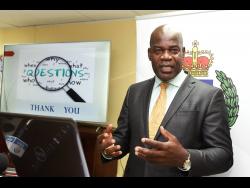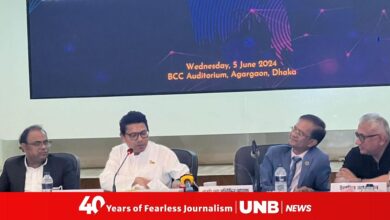DCP Bailey wants bill amended for time limit on telecoms to provide wiretaps | Lead Stories

Deputy Commissioner of Police Fitz Bailey wants the Interception of Communications Act to be amended to impose a time limit within which telecommunication companies should provide information requested by the police.
The act, which was passed in 2002, allows the security forces to tap the telephones of persons suspected of, or accused of, criminal involvement.
It authorises the interception of all of the communication of a specific person named in a warrant, and enables authorised officers to request technical information from telecommunications service providers under the Telecommunications Act.
But, voicing his disapproval with the slow pace at which information applications are addressed by telecommunication companies, Bailey said crime-fighting efforts are hampered as a result.
“Most of the things that we do, as it relates to communication, we have to get orders from the court, and all of that which sometimes slows down the process in terms of the speed and the flow of the investigation,” told The Gleaner.
Bailey was the guest speaker at the inaugural security seminar dubbed ‘Enhancing Physical Security Through Technology’, which was hosted by Shields Crime and Security Consultants at The Jamaica Pegasus hotel yesterday.
The seminar showcased innovative technological security solutions from leading global providers California-based Verkada Integrated Security Systems and Israeli-based Cawamo, focusing on empowering organisations to improve their security and effectively combat crime.
Telling The Gleaner that while he “understands the business concern of those enterprises (as) they are in the business to make money”, and there are no direct financial gains from working with the police, Bailey argued that national security should also be a priority, as the crime rate directly impacts the economy.
He stressed that communication forensics is one of the most essential tools utilised by the security forces, and is adamant that the amendment of the law which guides its operation in that area will strengthen its efforts.
Meanwhile, the deputy commissioner, who is up for retirement from the Jamaica Constabulary Force (JCF) in a few months, after serving for more than 40 years, wants the budgetary allocation for the security forces to be sustained, irrespective of which political party forms the Government.
According to Bailey, significant investment has been made in technological advancement of the JCF, which has helped it fight crime. He pointed to the more than 700 murders solved by the force in 2022, and over 600 which were solved last year.
“On a yearly basis, we save in excess of 350,000 threats to life, and a lot of those we get through technology … technological solutions assist us. Somebody may be trying to kill you and you are not aware. So, a lot of times, we become aware of that and it’s through technology so we can make that advance, that proactive time of engagement,” he told The Gleaner.
Technological projects
He noted that there are 22 ongoing technological projects in the JCF.
“The integration of technology within the Jamaica Constabulary Force is not just a choice but a necessity in fulfilling our mandate to protect and serve the citizens of Jamaica. By embracing technological advances, we can significantly enhance our crime-fighting capabilities, improve the quality of police services, and foster greater trust and cooperation within our communities,” he stated.
A little under $50 billion was allocated to the JCF’s public safety and internal security programme in the 2024-2025 national security budget.
In emphasising the importance of continued prioritisation of the security forces in the budget, Bailey said this will keep it apace with emerging technology and “bring the force to the level that we want to take it”.
“We can’t start this journey and then we have to just abandon it because of a lack of fiscal allocation,” he said. “We should not as law enforcement be subjected to the priority of administration because different administrations may have different priority.
“Let’s explore the possibility that when it comes to national security there is some framework in place to ensure that irrespective of which government is in power the sustainability of the budgetary allocation is continued,” Bailey stated.
Meanwhile, founder of Shields Crime and Security Consultants and former deputy commissioner of police, Mark Shields, lauded the JCF for the progress it has made in technological advancement.
“Transformation in the Jamaica Constabulary Force is happening, they have transformed. If you look at the levels of technology they now have to do their jobs, it is incredible,” he said.



